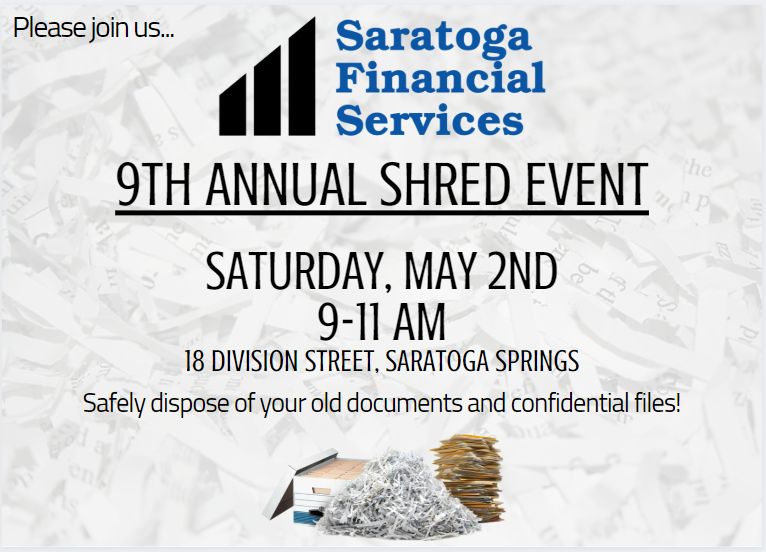Join Us for Our 9th Annual Shred Event!
Submitted by Saratoga Financial Services on February 10th, 2020
Come join us at our 9th Annual Shred Event and safely dispose of your old documents and confidential files!
Saturday, May 2nd
9-11am
18 Division Street, Saratoga Springs
We have partnered with the Saratoga County Chamber of Commerce, Confidata, Fingerpaint and the Saratoga Business Journal again this year to make the event community-wide in recognition of Earth Day! All paper will be shredded, baled and shipped to local paper mills to be recycled for reuse. The event will be located at the Fingerpaint parking lot outside of our office building at 18 Division Street in Saratoga Springs.
The event is free of charge but monetary donations will be accepted to benefit the local Act With Respect Always program to help spread the “pay it forward” movement!
Unsure of what to keep or what to shred?
What records should you keep?
Keep two files - short-term and long-term.
Short-term files would include items from the past year, such as:
-paid or unpaid bills
-bank statements & credit card statements
-canceled checks
-health records
-updated resume or employment records
-major purchase receipts
-insurance policies
-income tax receipts for deductions, income, etc.
Long-term files should include:
-bank statements & credit card statements (with home improvement expenses)
-receipts for home improvements
-canceled checks
-warranties and operating instructions for appliances
-income tax records
-gift tax returns
-inheritance papers
-retirement investment statements
-investment account statements (primarily year-end statements with tax info)
-legal papers about formerly owned properties
-reports from trusts
-birth certificates
-Social Security cards
-burial vault/plot deeds
-wills/living wills
-powers of attorney
-car titles
-house titles/deeds
How long should you keep these records?
Three Years:
-household bills
-credit card statements
-receipts for minor purchases
Seven Years:
-canceled checks
-check registers
-bank statements
-pay stubs (primarily year-end stub with all info)
-tax returns and supporting documentation
Forever (or until assets are sold):
-receipts for home improvements
-receipts for major purchases
-annual investment statements
-gift tax returns
-inheritance papers
-insurance policies
-mutual fund statements
-copy of your will
-health care proxy forms
*Remember that many financial statements are now available online.
Source: MFS



